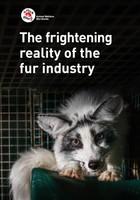
Global Fur Bans in Cities, States and Countries
Ending the Suffering of Animals in the Fur Industry – Major Milestones in 2020 & 2021
Countries and states have been responding to growing public opposition by enacting bans on both fur farming and the sale of fur as the most effective means to bring this cruel, deadly, and deceptive fur industry to an end. Many similar jurisdictions in Europe and the US have implemented fur farming or trade bans and can serve as models for Australia.
Fur farming has been prohibited in Austria, Croatia, the Netherlands, Slovenia, and the UK. While many remaining countries are phasing out farming, such as Belgium, Czech Republic, Bosnia and Herzegovina, Luxembourg, Norway, Serbia, Slovakia, and the Republic of Macedonia. Recently Estonia and France announced a ban on fur farming, and Ireland made a commitment to bring forward legislation in 2021. Switzerland and Germany both adopted stricter regulations, rendering breeding unprofitable. Similarly, Sweden eliminated fox and chinchilla production in this way, and Denmark prohibited the breeding of foxes on animal welfare grounds. Israel became the world’s first country to prohibit the sales of fur. The ban will come into force by the end of 2021.
In the US, major cities have instituted bans on fur sales, with other cities following suit and introducing similar bills, for instance New York City. California became the first US state to ban fur, and more states are getting on board, including Connecticut, Hawaii, Oregon, Massachusetts, and Rhode Island.
Australia
(Read an update on Australia lagging behind global fur action here.)
Australia imports millions of dollars’ worth of real and faux fur products each year, a portion of which have been found to be mislabelled as faux when they are in fact real fur. Australian fur imports often include less expensive fur items, such as trims on clothing, accessories, souvenirs, and children’s toys.
- FOUR PAWS investigations have exposed mislabelled fur products across NSW and Victoria, deceiving Australian consumers and highlighting an alarming lack of transparency and traceability in fur supply chains. The investigations found that real fur items were deliberately mislabelled as ‘faux’, or as being from a different species than what DNA tests revealed. Indeed, deceptive labelling is a worldwide problem, and it has been found that products are deliberately mislabelled when exported to countries where there is local opposition to fur.
In Australia, there is an absence of laws on fur sales and use, but NSW and Victoria should lead the way by enacting bans on fur sales, accompanied by information standards on labelling and testing mechanisms.
- The Animal Justice Party in Victoria is working towards a ban on fur and exotic products and successfully passed a motion to investigate illegal fur labelling and to establish a taskforce1. While in NSW, the Animal Justice Party passed a motion condemning fur supported by the Upper House2.
- We have also seen the successful passing of six motions to ban fur (and exotic animal products) in the following New South Wales councils:
- City of Sydney3
- Inner West Council4
- City of Canterbury Bankstown5
- Blue Mountains City Council6
- Liverpool City Council7
- FOUR PAWS is working with the Animal Justice Party to urge both NSW and Victoria, and the councils in those states, to enact bans on the import and sale of fur products. The action by councils is evidence of the strong community opposition to fur and exotic animal products.
- At present, there is an absence of federal or state laws in Australia on the use and sale of fur. Even in relation to cat and dog fur, there is no direct ban on its use and sale in any state or territory, including NSW and Victoria.
- Nationally, the importing and exporting of cat and dog fur into and out of Australia is prohibited8. However, there are exemptions9 and the regulations do not specify criteria for granting permission to import or export cat and dog fur.
- There are also no tracing or testing mechanisms in place at customs to ascertain the source of fur and whether fur is real or fake.
How can you help?
- Sign the petition to ban fur in Australia
- Ask brands to commit to being a Fur Free Retailer
Fur Free Retailer is a global initiative in ethical fashion. They provide a comprehensive list of brands that have committed to being fur free. Check if your favourite brand is on the list. If not, you can write to them and ask them to join the movement. Read more.

The spread of SARS-CoV-2, the virus which causes Covid-19, continues to escalate within mink farming in Europe and the US. The already greatly suffering mink are dying in the thousands – animals who are not culled are left untreated and die from severe respiratory distress due to Covid-19. Fur farms present similar dangers to wet markets for disease emergence and spread, both for Covid-19 and possible future zoonosis which could also result in a pandemic.
Given the global consequences we are battling, precaution should be exercised, and fur farming should be brought to an end.
There is no place for the cruel fur industry in a modern, compassionate society. Together we will see the end of the cruelty it inflicts upon millions of animals.
#BanFur
Source
2 NSW Parliamentary Debates, Legislative Council, 14 November 2019
3 City of Sydney Council, https://meetings.cityofsydney.nsw.gov.au/ieListDocuments.aspx?CId=133&MId=3666
4 Inner west Council, https://innerwest.infocouncil.biz/Open/2020/06/C_23062020_AGN_3753_AT_WEB.htm
5 City of Canterbury Bankstown, https://www.cbcity.nsw.gov.au/Councilccb/docs/ORD_26052020_AGN.pdf
6 Blue Mountains City Council, https://www.bmcc.nsw.gov.au/documents/2020-08-25-council-meeting-business-paper
7 Liverpool City Council, http://liverpool.infocouncil.biz/Open/2020/10/CO_20201027_AGN_423_AT_WEB.htm
8 Customs (Prohibited Imports) Regulations 1956 (Cth) r 4W (1); Customs (Prohibited Exports) Regulations 1958 (Cth) 9AB (1)
9 Customs (Prohibited Imports) Regulations 1956 (Cth) r 4W (3); Customs (Prohibited Exports) Regulations 1958 (Cth) 9AB (3)



